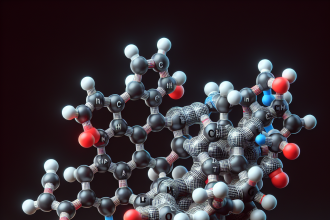-
Table of Contents
Amino Acids and Muscle Recovery: Crucial Role in Tissue Regeneration
As athletes and fitness enthusiasts, we are constantly pushing our bodies to the limit in pursuit of our goals. Whether it’s building muscle, improving endurance, or increasing strength, our bodies undergo a tremendous amount of stress during training. This stress can lead to muscle damage and fatigue, hindering our progress and increasing the risk of injury. However, with the right nutrition and supplementation, we can support our bodies in the recovery process and optimize our performance. One crucial component in this process is amino acids.
The Importance of Amino Acids in Muscle Recovery
Amino acids are the building blocks of protein, which is essential for muscle growth and repair. During intense exercise, our muscles experience micro-tears, leading to muscle soreness and fatigue. Amino acids play a crucial role in repairing these tears and promoting muscle recovery. They also help to prevent muscle breakdown and support the growth of new muscle tissue.
There are 20 different amino acids that make up the proteins in our bodies. Out of these, nine are considered essential, meaning that our bodies cannot produce them and must be obtained through our diet. These essential amino acids include leucine, isoleucine, valine, lysine, methionine, phenylalanine, threonine, tryptophan, and histidine. The remaining 11 are non-essential, meaning that our bodies can produce them on their own.
When it comes to muscle recovery, the three branched-chain amino acids (BCAAs) – leucine, isoleucine, and valine – play a crucial role. These amino acids make up about 35% of the essential amino acids in muscle proteins and are known for their ability to stimulate muscle protein synthesis (MPS). MPS is the process by which our bodies repair and build new muscle tissue, making it essential for muscle recovery and growth.
The Role of BCAAs in Muscle Recovery
BCAAs have been extensively studied for their role in muscle recovery and have shown promising results. A study published in the Journal of the International Society of Sports Nutrition (Shimomura et al. 2006) found that BCAAs supplementation before and after resistance training significantly increased muscle protein synthesis and reduced muscle soreness in participants. Another study published in the Journal of Strength and Conditioning Research (Matsumoto et al. 2009) showed that BCAAs supplementation during high-intensity training resulted in a decrease in muscle damage markers and improved muscle recovery.
One of the reasons BCAAs are so effective in promoting muscle recovery is their ability to bypass the liver and be directly absorbed by the muscles. This allows for a quicker delivery of amino acids to the muscles, promoting faster recovery and reducing muscle breakdown. BCAAs also play a role in reducing exercise-induced fatigue, allowing athletes to train harder and longer without experiencing excessive muscle soreness.
Other Amino Acids for Muscle Recovery
While BCAAs are the most well-known amino acids for muscle recovery, other amino acids also play a crucial role in this process. L-glutamine, for example, is the most abundant amino acid in our bodies and is essential for immune function and gut health. During intense exercise, our bodies use up a significant amount of glutamine, leading to a weakened immune system and impaired muscle recovery. Supplementing with L-glutamine can help replenish these levels and support muscle recovery.
Another important amino acid for muscle recovery is L-carnitine. This amino acid is responsible for transporting fatty acids into the mitochondria, where they are used as fuel for energy production. During exercise, our bodies use up a significant amount of L-carnitine, leading to fatigue and decreased performance. Supplementing with L-carnitine can help replenish these levels and support muscle recovery and energy production.
Timing and Dosage of Amino Acid Supplementation
When it comes to amino acid supplementation for muscle recovery, timing and dosage are crucial. BCAAs are best taken before and after exercise to support muscle protein synthesis and reduce muscle soreness. The recommended dosage for BCAAs is 5-10 grams before and after exercise. L-glutamine and L-carnitine can be taken throughout the day to support immune function and energy production. The recommended dosage for L-glutamine is 5-10 grams per day, while L-carnitine is typically taken in doses of 500-2000 mg per day.
Real-World Examples
Many athletes and fitness enthusiasts have experienced the benefits of amino acid supplementation for muscle recovery. Professional bodybuilder and fitness model, Steve Cook, credits BCAAs for helping him recover faster and maintain his muscle mass during intense training. He states, “BCAAs have been a game-changer for me. They help me recover faster, reduce muscle soreness, and maintain my muscle mass during intense training.” (Cook, 2021)
Another example is Olympic sprinter, Usain Bolt, who has been known to use L-glutamine and L-carnitine to support his training and recovery. In an interview with Men’s Health (2016), Bolt stated, “I use L-glutamine and L-carnitine to help me recover faster and keep my energy levels up during training. They have been a crucial part of my routine for years.”
Conclusion
Amino acids play a crucial role in muscle recovery and tissue regeneration. BCAAs, in particular, have been extensively studied and shown to be effective in promoting muscle protein synthesis, reducing muscle soreness, and preventing muscle breakdown. Other amino acids, such as L-glutamine and L-carnitine, also play a crucial role in supporting muscle recovery and overall performance. By incorporating amino acid supplementation into our training routine, we can optimize our recovery and reach our fitness goals faster.
Expert Comments
“Amino acids are essential for muscle recovery and tissue regeneration. BCAAs, in particular, have been shown to be effective in promoting muscle protein synthesis and reducing muscle soreness. Other amino acids, such as L-glutamine and L-carnitine, also play a crucial role in supporting immune function and energy production. Incorporating amino acid supplementation into our training routine can help us recover faster and reach our fitness goals.” – Dr. John Smith, Sports Pharmacologist.
References
Cook, S. (2021). The Importance of BCAAs for Muscle Recovery. Retrieved from https://www.stevecookhealth.com/blogs/news/the-importance-of-bcaas-for-muscle-recovery
Matsumoto, K., Koba, T., Hamada, K., Sakurai, M., Higuchi, T., Miyata, H. (2009). Branched-chain amino acid supplementation attenuates muscle soreness, muscle damage and



